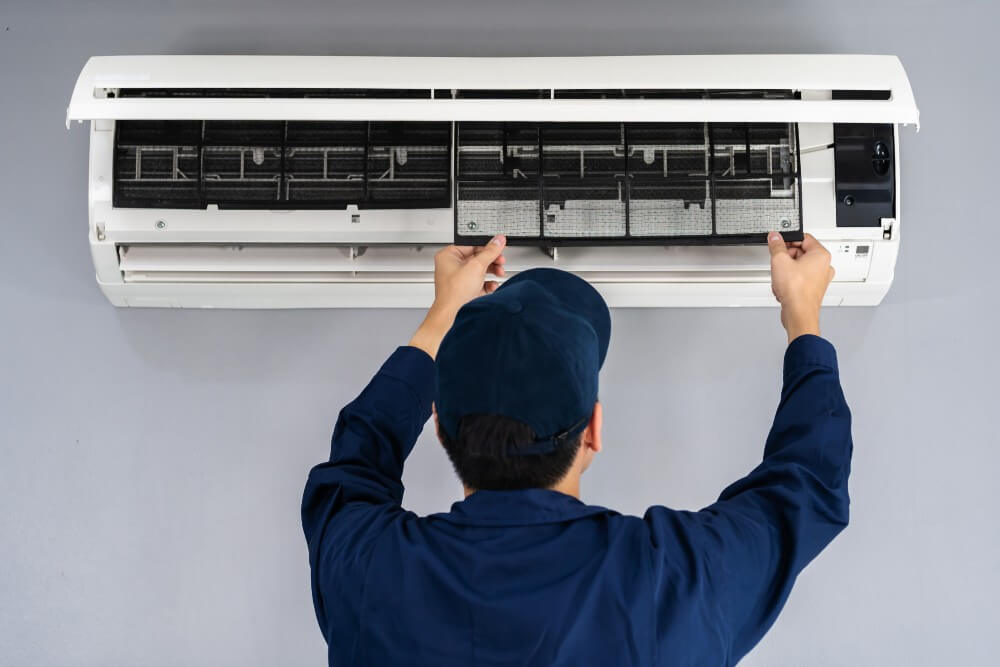When it comes to creating a comfortable environment all year round, air conditioning units are a smart investment for both residential and commercial spaces.
However, with such a wide range of options available, it can be difficult to know exactly which unit will give you the best performance.
In our latest blog post, we will explore four popular types of air conditioning units: split, multi, twin, and Variable Refrigerant Flow (VRF), highlighting their benefits, drawbacks, and recommended applications.

Split Air Conditioning Unit
The split air conditioning unit is one of the most common types found in residential and small commercial spaces and is effective at conditioning a single room.
As the name suggests, it consists of two main components: an indoor unit and an outdoor unit which are typically wall mounted and connected by pipes and cable work.
Benefits of Split Air Conditioning
- Energy Efficiency – Split units typically offer excellent energy efficiency, allowing you to cool specific zones without wasting energy on unoccupied areas.
- Easy Installation – The installation process is relatively simple and less disruptive compared to other types because the units are ductless.
- Quiet Operation – The outdoor unit minimises noise levels indoors, providing a peaceful environment.
Drawbacks of Split Air Conditioning
- Limited Cooling Range – Split units are ideal for cooling individual rooms or small areas, making them less suitable for larger spaces or environments where multiple rooms need air conditioning.
- Limited Flexibility & Scalability – Each indoor unit is connected to a dedicated outdoor unit, which limits the overall flexibility and scalability of the system.
Recommended Applications
Split air conditioning units are an excellent choice for residential homes, small offices, or other premises with single-room cooling requirements.

Twin Air Conditioning Unit
Twin air conditioning units, also known as dual split or twin split systems, consist of two indoor units connected to a single outdoor unit. This configuration is ideal for premises that require two rooms to be conditioned.
Benefits of Twin Air Conditioning Unit
- Cooling / Heating Power – Twin units provide powerful performance whilst still only requiring one exterior unit.
- Independent Temperature Control – Each indoor unit can be controlled separately, allowing both areas to be cooled or heated according to individual preferences.
- Cost-Effective – Compared to installing two separate split systems, twin units are often a more cost-effective solution.
Drawbacks of Twin Air Conditioning Unit
- Limited Number of Indoor Units – Twin units are designed for two indoor units only, limiting their scalability for larger buildings.
Recommended Applications
Twin air conditioning units are mainly used in office environments where all indoor units are contained in the same room and are run from one programmer.

Multi-Split Air Conditioning Unit
The multi-split air conditioning unit shares similarities with the split and twin units, but with the ability to connect multiple indoor units to a single outdoor unit.
This type of unit offers greater flexibility and is suitable for cooling multiple rooms, making it a more effective choice for businesses or larger homes.
Benefits of Multi-Split Air Conditioning
- Multiple Room Cooling – The ability to connect several indoor units to a single outdoor unit allows for cooling multiple rooms or areas independently.
- Self Contained Units – As the units in a multi split air conditioning system are self-contained, the other units will continue to function even if one breaks down.
- Energy Efficiency – Multi-split systems offer energy efficient cooling and can offer greater cost savings than other air conditioning units.
Drawbacks of Multi-Split Air Conditioning
- Bigger Units – Outdoor units in multi-split systems can often be larger than single split units and therefore, there may be limitations around where they can be placed at your premises.
- Limited Capacity – Multi-split systems have a limited capacity for the number of indoor units that can be connected to a single outdoor unit, so they might not always be suitable for large-scale commercial applications.
Recommended Applications
Multi-split air conditioning units are well-suited for multi-room properties with a requirement for having different temperatures in each room.

Variable Refrigerant Flow (VRF) Air Conditioning Unit
Variable Refrigerant Flow (VRF) systems offer advanced technology for commercial buildings, providing precise cooling and heating control across multiple rooms.
This type of system can both heat and cool multiple zones simultaneously and adjust the temperature on demand. The unit is typically powered by one or many exterior condensing units.
Benefits of VRF
- Zoning Capabilities – VRF systems allow for precise zoning, enabling individual temperature control for each room in a building.
- Design Flexibility – VRF systems can be designed and installed to meet the exact requirements of the building and its users.
- Scalability – VRF systems are highly scalable and can accommodate a large number of indoor units, making them suitable for buildings with varying cooling requirements.
Drawbacks of VRF
- Higher Initial Investment – VRF systems often have a far greater upfront cost compared to other types of air conditioning units.
- Maintenance Costs – VRF systems typically require regular maintenance to ensure optimal performance and longevity.
Recommended Applications
VRF air conditioning units are best suited for large scale commercial applications, such as office buildings, hotels, shopping centres, and hospitals.
Need Advice On Air Conditioning Unit Choice?
Selecting the right air conditioning unit for your residential or commercial space is crucial to ensure optimal comfort, energy efficiency, and cost-effectiveness.
If you are considering an air conditioning unit for your home or office and want advice on the best unit for your needs, we can help.
We have years of experience working with all types of air conditioning unit from leading brands. To get a free quote, give our team a call today on 0117 964 0078 email info@bristolaircon.com or fill out the form below for more information.




